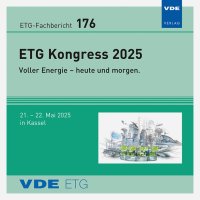Interconnected living labs with intelligent decision support for energy-optimized flexibility through sector coupling
Conference: ETG Kongress 2025 - Voller Energie – heute und morgen.
05/21/2025 at Kassel, Germany
Proceedings: ETG-Fb. 176: ETG Kongress 2025
Pages: 7Language: englishTyp: PDF
Authors:
Gurcke, Melina; Haubrock, Jens; Brandhorst, Leif; Kockhans, Laura; Bamberg, Sebastian; Rahlf, Henning; Hahn, Paul; Eberharter, Julia; Lazar, Arne; Kreipe, Robin; Westerbarkey, Peter; Hoewelhasse, Frank; Maier, Angelika
Abstract:
are large consumers of energy and offer excellent conditions for active sector coupling and the use of various synergy effects. There are several technical solutions addressing climate-neutral districts and sector coupling. However, in the past, climate-neutral districts have usually failed due to a lack of economic viability as well as conflicting stakeholder objectives, which have not yet been identified or resolved in practice. Therefore, the project FlexLabQuartier will address the barriers associated with the design and operation of climate-neutral districts by investigating solutions from a tech-nical, social and economic perspective. The project aims to deliver actionable outcomes, including innovative business models, user-oriented controls and a decision support tool to facilitate informed decision-making. In three interconnected living labs, Power-to-X technologies (X: Heat and Mobility) as well as political and planning aspects are implemented by means of sector coupling and the creation of flexibility. For the living lab Sennestadt dealing with coupling electricity and mobility, an optimized charging schedule for the charging of private electric vehicles is considered, whereby the optimization is based on the prediction of the production of local photovoltaic systems. The living lab Verl focusing on coupling electricity and heat investigates the flexibility potential of ambient heat, large heat pumps and combined heat and power units. In the living lab Borchen addressing political and planning aspects, a decision support tool is developed, that in addition to technical aspects, will also take into account legal frameworks. As the tech-nical implementations, support tools as well as the business models depend to a large extent on the acceptance of the various stakeholders, these developments are accompanied by social science studies. The most important insights from these studies will be derived and summarized in action guidelines for other regions in order to ensure the transferability of the results. By demonstrating urban and climate-neutral districts that adapt existing infrastructure, the aim is to prepare the ground for the implementation of investments in energy-efficient urban redevel-opment.


